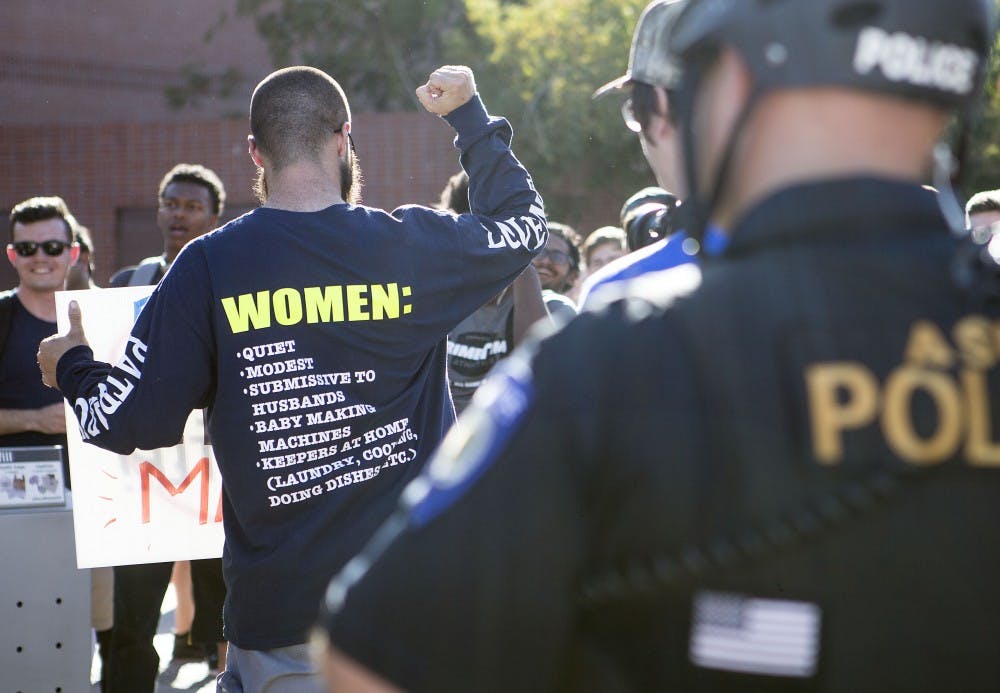Dean Saxton, commonly known as Brother Dean, is a controversial speaker who frequents ASU and UA. He is infamous for his offensive statements about women, members of the LGBTQ community, Muslims and just about every other minority group.
Some of his previous statements include “you deserve to be raped,” “all Muslims are pedophiles” and other bigoted claims.
His outrageous comments are always sure to draw a large crowd of students. Some come to simply watch, record or post the spectacle online. After all, it is not every day you hear someone yell that you will go to Hell through a megaphone.
Others come to confront him by arguing or yelling back, which usually incites an argument with more personalized attacks that elicit more engagement.
Whatever the reason for crowding around speakers such as Saxton, most students have either harmless or even noble intentions. However, students must realize that by becoming an active member of his audience, they encourage him to continue his tirades.
Elissa Adame, an assistant research professor at ASU's Hugh Downs School of Human Communication, said students should try to ignore hateful speakers.
“If your audience is not engaged, you are not likely to come back to them or to continue to engage with them,” Adame said. “Even in a public speaking class, you will see that when students have an audience that isn’t engaged with them, they become less excited and less motivated. I am guessing that someone like (Saxton), who is motivated by responses, would just retract and not come back without an audience.”
Speaking back to those who spread hate is often crucial in cases of social injustice, especially when a large group supports that hatred.
What makes Saxton different is that he does not have a large following and seems to speak only to evoke a response from his audiences with his inflammatory personal opinions.
While Saxton's words alone cannot cause physical harm, instigating a dispute with someone known for not backing down can.
In 2016, Saxton was arrested and temporarily banned from campus for allegedly kicking a UA student who confronted him, and in the same year he was hit over the head with a bat after making homophobic and sexist remarks.
Even after being arrested and physically assaulted, he has continued to appear on college campuses, so it seems no amount of confrontation will stop him.
“I don’t think students should try to have a conversation with somebody whose emotions and experiences are already elevated to the point of being combative,” Adame said.
The safest and most effective thing students can do is to ignore people like Saxton. It can be difficult, especially as he targets groups that already encounter prejudice. However, students may be better off using their voices and time to oppose more serious instances of injustice based in genuine beliefs.
Whereas Saxton's absurd views are not shared by many, there are other people and groups that have a significant impact on people who are marginalized. Peacefully confronting them instead of a man with a megaphone and inflammatory signs would be significantly more productive.
With an audience, Saxton and others like him can continue to spew mindless hatred. Without an audience, the worst they can be are a few people yelling at those who do not listen.
Reach the columnist at jkbeneve@asu.edu or follow @JacobBenevento on Twitter.
Editor’s note: The opinions presented in this column are the author’s and do not imply any endorsement from The State Press or its editors.
Want to join the conversation? Send an email to opiniondesk.statepress@gmail.com. Keep letters under 500 words and be sure to include your university affiliation. Anonymity will not be granted.
Like The State Press on Facebook and follow @statepress on Twitter.




